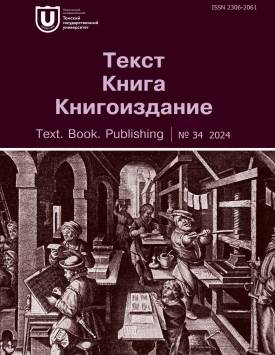Man and time in Tatiana Moskvina’s epistolary play Proklyataya Lyubov’ (on the author’s strategies)
The article justifies that, using well-known dramatic techniques, Tatyana Moskvina was able to create an original type of an “epistolary play” on documentary material. The material for her was the correspondence of the actress Angelina Stepanova and the playwright Nikolai Erdman, Stepanova's memories, and Erdman's texts. All this was carefully selected. Moskvina saw and highlighted in these documents symbolic details that were enlarged in the play due to repetitions, leitmotifs, and comments of the Human Note (a character introduced into the composition to explain historical and biographical realities and express the author's position). The fate of a creative person under a totalitarian regime is shown in close connection with time. However, Moskvina does not relieve the heroes of responsibility. Each of them has the right to choose in acute situations. The author makes it clear that it is not only time that forges the fate of the heroes. Moskvina's play is not only epistolary. The playwright uses all the staging strategies that are somehow close to her chosen era and heroes: vaudeville and carnival coming from Erdman's miniatures, skillfully made documentary editing, fictional dialogs built based on the logic of characters gleaned from the correspondence, and features of the biographical and creative fate. It is important for her that viewers perceive the material of the play not as someone's private story, and so the famous characters in the text of the play are simply named He and She. Moskvina remarkably combines biographical, documentary material and fiction. All the dialogues that she composed for the heroes speak of her psychological instinct and immersion in the era of great terror and great tension of forces. The play is full of all kinds of signal words and signs. They are Erdman's poems, a quote from Chekhov's play, the name and subtext of Jerome Kilty's play, and even silence. People of creative professions, the heroes instantly read multiple meanings and subtexts from any situation. This is especially sharply shown in the last meeting of Erdman and Stepanova, which partly sums up the results of their love and their fates. Fictional dialogues and genuine letters of the heroes are imbued with a lively mind and energy of resistance to circumstances, which gradually fades away from Erdman and is transformed into creativity by Stepanova. An elegant and tragic commentary on the heroes' life is the play Dear Liar by Jerome Kilty, in which Stepanova performed one of her most brilliant roles. Before our eyes, a comparison of the fate of the heroes of Kilty with the fate of the Soviet playwright and actress turns into an accusation of “dictatorial snouts”. Free use of Erdman's works, personal correspondence, excerpts from Memoirs of Stepanova and the people who knew her, the careful development of characters in fictional fragments - all this allowed Moskvina to bring the document to the level of high artistry and create a “stage composition” combining psychological persuasiveness, a natural play space, and a strong historical field. Moskvina's new type of epistolary play is for both theater and reading. Her authorial strategy opposes hypernaturalism and the pitch-dark hero of the postmodern drama. The author declares no conflicts of interests.
Keywords
author's strategies, epistolary play, Russian drama of early 21st century, new documentaryAuthors
| Name | Organization | |
| Krylova Snezhana V. | Moscow Region State University | sv.krylova@mgou.ru |
References

Man and time in Tatiana Moskvina’s epistolary play Proklyataya Lyubov’ (on the author’s strategies) | Tekst. Kniga. Knigoizdanie - Text. Book. Publishing. 2024. № 34. DOI: 10.17223/23062061/34/4
